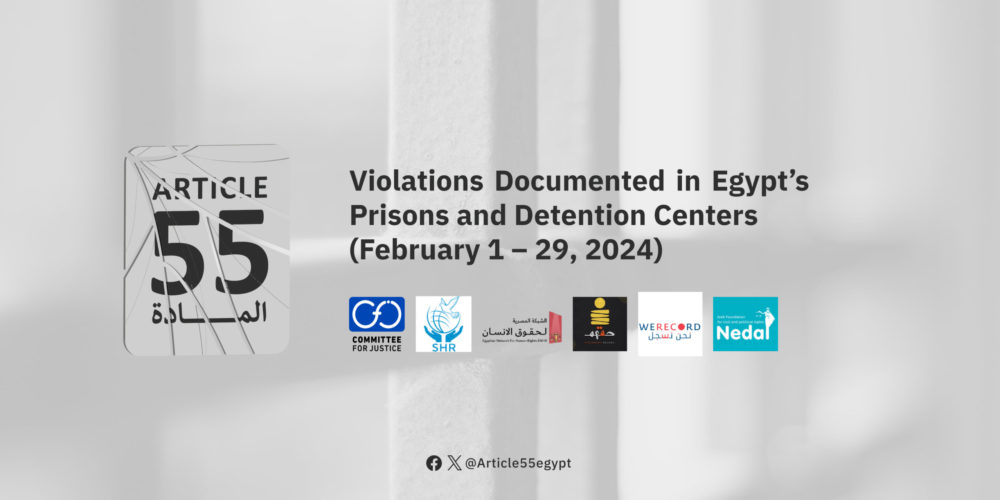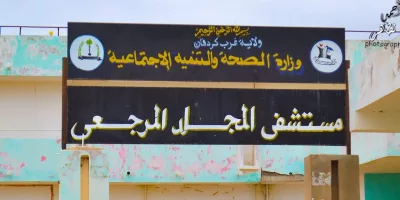The organizations participating in the Article 55 Coalition stated that with the onset of February 2024, the effects of the economic crisis in Egypt have not subsided. The citizens’ struggle persisted as the prices of almost all essential commodities continued to rise, coinciding with the significant gap between the official exchange rate of the US dollar in banks and its rate in the parallel market.
This was conveyed in the coalition’s monthly newsletter, reporting on the latest developments in the situations and highlighting violations observed within detention centers and prisons in Egypt.
Economic Developments:
The bulletin highlighted the Ministry of Interior’s resort to intensifying security campaigns against currency traders in the parallel market, targeting both dealers and traders. Citizen testimonies emerged at the beginning of the month, recounting unexpected inspections by Ministry of Interior personnel. This move by the authorities aimed to control the exchange rate in that market and narrow the gap.
Rumors circulated about an anticipated deal between several Emirati companies and the Egyptian government to sell the city of Ras El Hekma, situated on the shores of the Mediterranean Sea along the northwestern coast. This information was confirmed by the Egyptian Prime Minister on February 23, who spoke about the financial installments the Egyptian government would receive. However, he did not disclose whether these amounts were in exchange for selling an area of up to 170 million cubic meters or the right to use the lands.
Forced Evictions:
Residents of the al-Gameel neighborhood west of Port Said city also faced forced eviction from their homes as part of an alleged development plan. Authorities utilized security measures, led by the Ministry of Interior, to suppress any attempts by residents to cling to their homes. This resulted in the death of one citizen during the demolition operations.
War on Gaza:
The editor-in-chief of Mada Masr website, Lina Atallah, was summoned for investigation by the Cairo Appeals Prosecution due to the website publishing an investigation into the Sinai businessman, Ibrahim Al-Organi, revealing the massive profits of his company, Hala from those fleeing the Gaza war. The investigation exposed the bribes or what is known as “coordination fees” that those stranded in Gaza, including Palestinians and holders of Egyptian passports, are forced to pay to leave the Israeli-blockaded territory.
Legal and judicial developments:
On the legal front, Egyptian President Abdel Fattah El-Sisi ratified Law No. 4/2024 amending certain provisions of Law No. 109/1971 regarding the police force during the month. Many experts view this amendment as a serious undermining of judicial authorities.
Additionally, on February 6, the Misdemeanor Court of Matariya issued a verdict sentencing the former potential presidential candidate, Ahmed El-Tantawi, and his campaign manager, Mohamed Abu Al-Diyar, to one year in prison with a bail of 20,000 Egyptian pounds, pending appeal. Furthermore, the Economic Misdemeanor Court in Tanta sentenced the assistant professor at the Faculty of Engineering, Kyrillos Rafat Nashad, to six months in prison with a suspended sentence, a fine of 100,000 Egyptian pounds, and a temporary civil compensation of 20,000 Egyptian pounds. This was in connection to charges of violating the privacy of Bishop Benjamin, the Metropolitan of Menoufia, and contempt of the Christian religion, stemming from religious discussions between the parties.
Violations in Detention Centers and Prisons:
Regarding the monitoring of violations within detention centers and prisons in Egypt, the coalition of organizations documented three cases of death within detention centers in February. They also recorded an urgent plea from the wife of the detainee Abdel Rahman Hassan Dabi, held in solitary confinement in the New Valley Prison for over 10 months. He suffers from unsanitary conditions, lacking even a water jug for basic needs, and is deprived of books, recreation, and his prescription glasses except during visitation.
Furthermore, the coalition organizations observed a partial hunger strike by several prisoners at the Wadi El Natrun 2 Rehabilitation and Reform Center, protesting against the violations committed by the prison administration and the arbitrary denial of their basic human rights. There was also an appeal from the lawyer of the detainee Tahir Jamal, held in pretrial detention for almost 4 years, describing the latter’s attempted suicide after exhausting all available avenues for his release.
Coalition’s demands:
In light of the aforementioned, the organizations within the Article 55 Coalition view the conditions inside prisons and detention centers not as surprising events but as part of the general framework of how Egyptian authorities handle detainees, especially political ones. The situation is perceived as deliberate rather than isolated individual violations, as promoted by the Egyptian Ministry of Interior.
Moreover, the policy of impunity employed by Egyptian authorities towards human rights violators within detention centers has encouraged and fueled such practices, making them a standard operating procedure within the Egyptian prison system. There has been no evidence of any leadership or official being punished or even reprimanded despite the documented and well-established violations that may have occurred.
Therefore, the organizations in the Article 55 Coalition emphasize that these practices occurring within Egyptian prisons and detention centers raise serious concerns about the fate of detainees, especially with the increasing number of deaths within detention centers in recent times and the deteriorating living conditions within them.
The coalition organizations also call for an investigation into these violations, holding those responsible accountable according to both Egyptian and international law. They advocate for the implementation of the United Nations Standard Minimum Rules for the Treatment of Prisoners, adherence to Egyptian prison regulations, and an end to their violation. Additionally, they demand the provision of living conditions that are in line with the humanity of the detainees.






